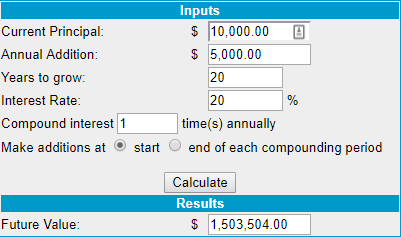
Buying index funds is a great way to diversify your portfolio and save money. An index fund is a fund which replicates a particular index, such as S&P 500 or Dow Jones Industrial Average. These funds are very similar to mutual funds except they include multiple companies. These funds are generally less risky than individual stocks, and they can be a time-saver by avoiding the hassle and expense of researching companies. You can also buy them online from a brokerage.
Although buying index funds is easy, there are some things you need to know. You cannot be certain that your investment will yield a return. A mix of high- and low-risk assets is necessary to build a solid portfolio. But if your retirement plans are more recent, you might want to invest more money in higher risk assets. An investment mistake can cause you to delay retirement for years.
A diversification strategy that includes buying index funds that include companies from different industries might be an option. For example, you may want to purchase an index fund with companies from clean energy. Another option is to add funds from foreign countries. Another idea is to use index funds to reduce your tax liability. Many experts recommend reinvesting dividends. This can lead to significant investment growth.

Another benefit of index funds is the transparency. Index funds are low-cost and require little maintenance. This makes them a great choice for new investors. However, before you invest in one of these companies, make sure you do your research.
The risk of investing in index funds should be considered. High-fee index funds are not recommended. You can lose your returns if you invest in a fund that charges a high fee. Also, an index fund with lots of low-return funds in it will lower your overall average return.
The most important part about buying index funds are the choices you make. It can be difficult to pick the best index fund, but a good brokerage should be able to give you several options. An index fund can be based on an industry, country, business sector, and even a currency. It should also have a low expense ratio. The expense ratio represents the annual fee for managing the fund.
It is possible to diversify your portfolio by purchasing an index fund that has several companies from either a small company, or a growth stock. An index fund that includes a variety of stocks is likely to be the most advantageous. However, a fund with just a few stocks may underperform.

You should consider your objectives and needs when choosing an index fund. It is possible to choose to invest in index funds related to currencies, clean energy, or new technologies.
FAQ
How Does Inflation Affect the Stock Market?
Inflation affects the stock markets because investors must pay more each year to buy goods and services. As prices rise, stocks fall. That's why you should always buy shares when they're cheap.
What is a mutual-fund?
Mutual funds are pools or money that is invested in securities. They offer diversification by allowing all types and investments to be included in the pool. This reduces risk.
Professional managers oversee the investment decisions of mutual funds. Some funds permit investors to manage the portfolios they own.
Mutual funds are often preferred over individual stocks as they are easier to comprehend and less risky.
Why is a stock called security?
Security refers to an investment instrument whose price is dependent on another company. It can be issued by a corporation (e.g. shares), government (e.g. bonds), or another entity (e.g. preferred stocks). If the underlying asset loses its value, the issuer may promise to pay dividends to shareholders or repay creditors' debt obligations.
Statistics
- Individuals with very limited financial experience are either terrified by horror stories of average investors losing 50% of their portfolio value or are beguiled by "hot tips" that bear the promise of huge rewards but seldom pay off. (investopedia.com)
- Ratchet down that 10% if you don't yet have a healthy emergency fund and 10% to 15% of your income funneled into a retirement savings account. (nerdwallet.com)
- The S&P 500 has grown about 10.5% per year since its establishment in the 1920s. (investopedia.com)
- For instance, an individual or entity that owns 100,000 shares of a company with one million outstanding shares would have a 10% ownership stake. (investopedia.com)
External Links
How To
How to Invest Online in Stock Market
Stock investing is one way to make money on the stock market. There are many ways to do this, such as investing through mutual funds, exchange-traded funds (ETFs), hedge funds, etc. The best investment strategy depends on your risk tolerance, financial goals, personal investment style, and overall knowledge of the markets.
To be successful in the stock markets, you have to first understand how it works. This includes understanding the different types of investments available, the risks associated with them, and the potential rewards. Once you understand your goals for your portfolio, you can look into which investment type would be best.
There are three types of investments available: equity, fixed-income, and options. Equity refers a company's ownership shares. Fixed income refers to debt instruments such as bonds and treasury notes. Alternatives include commodities, currencies and real estate. Venture capital is also available. Each option comes with its own pros and con, so you'll have to decide which one works best for you.
Once you have determined the type and amount of investment you are looking for, there are two basic strategies you can choose from. One strategy is called "buy-and-hold." You purchase a portion of the security and don't let go until you die or retire. The second strategy is called "diversification." Diversification involves buying several securities from different classes. For example, if you bought 10% of Apple, Microsoft, and General Motors, you would diversify into three industries. Multiple investments give you more exposure in different areas of the economy. Because you own another asset in another sector, it helps to protect against losses in that sector.
Risk management is another key aspect when selecting an investment. Risk management can help you control volatility in your portfolio. If you were only willing to take on a 1% risk, you could choose a low-risk fund. You could, however, choose a higher risk fund if you are willing to take on a 5% chance.
Your money management skills are the last step to becoming a successful investment investor. The final step in becoming a successful investor is to learn how to manage your money. Your short-term, medium-term, and long-term goals should all be covered in a good plan. That plan must be followed! Do not let market fluctuations distract you. Your wealth will grow if you stick to your plan.